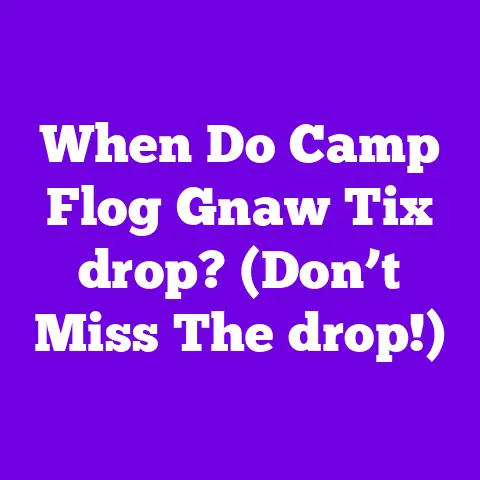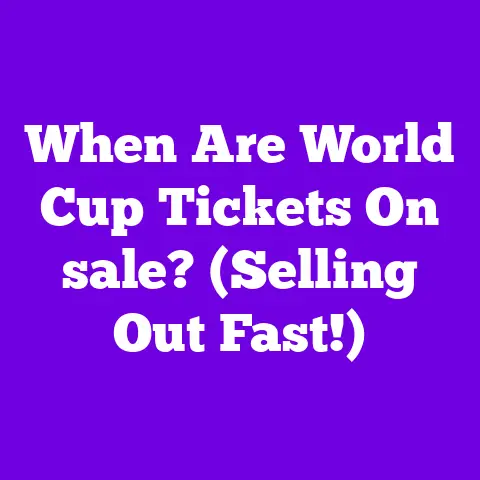When Do Fireworks Go On sale? (Before They’re Gone!)
Every year, as the Fourth of July approaches, I hear countless enthusiasts lament the same issue: “Why can’t I find the fireworks I want before they sell out?” It’s a frustration I understand intimately.
The anticipation of vibrant displays lighting up the night sky is a feeling many of us share, especially during major holidays and events.
The sizzle, the pop, the burst of color – it’s all part of the celebratory experience.
But that experience can quickly turn sour if you’re left scrambling at the last minute, only to find empty shelves and disappointed faces.
That’s why understanding when and where fireworks go on sale is crucial, especially as we look ahead to the celebrations of 2025.
So, let’s dive in and make sure you’re ready to light up the sky without the last-minute stress.
The Fireworks Calendar: Timing is Everything
The fireworks sales schedule isn’t a one-size-fits-all situation.
It varies significantly across the United States, influenced by state laws, local ordinances, and even regional traditions.
Knowing the typical timelines in your area can be the difference between a spectacular show and a sparkler-only celebration.
Generally, the peak fireworks sales periods revolve around major holidays, most notably:
- Independence Day (July 4th): This is the big one!
Sales typically begin a few weeks before July 4th and continue through the holiday. - New Year’s Eve (December 31st): Many states permit fireworks sales in the days leading up to New Year’s Eve, allowing revelers to ring in the new year with a bang.
- Other Local Festivities: Some regions have specific holidays or festivals where fireworks are permitted and sold.
For example, some areas with a strong Hispanic population will have sales around Cinco de Mayo.
The exact dates will depend on where you live.
Some states, like Pennsylvania, have very restrictive laws, only allowing the sale of “consumer fireworks” around specific holidays.
Others, like Arizona, have much more lenient regulations, permitting sales year-round.
To give you a clearer picture, here’s a simplified, illustrative timeline.
Note: These are general guidelines, and you should always verify the specific regulations in your state and locality.
Important Note: Always check your local regulations.
A quick search for “[Your State] fireworks laws” should provide the information you need.
Understanding Local Regulations: The Legal Landscape
Navigating local laws and regulations surrounding fireworks can feel like traversing a minefield.
The rules vary significantly from state to state, and even within different municipalities in the same state.
This patchwork of regulations often leads to confusion and, unfortunately, unintentional violations.
State-Level Differences:
- Year-Round Sales: Some states, like Arizona and Nevada, allow the sale of certain types of fireworks year-round.
However, even in these states, there may be restrictions on the types of fireworks that can be sold and used. - Restricted Sales: Other states, like Illinois and Massachusetts, have much stricter regulations.
They may only allow the sale of “consumer fireworks” during specific periods or ban certain types of fireworks altogether.
In some cases, you may need a permit. - Permits and Licenses: For larger displays or certain types of fireworks, you may need to obtain a permit or license from your local government.
This often involves submitting an application, paying a fee, and demonstrating that you have the necessary knowledge and safety precautions in place.
Finding the Information You Need:
The best way to understand your local fireworks regulations is to consult your state’s official government website or contact your local fire marshal’s office.
These resources can provide you with accurate and up-to-date information on:
- Permitted types of fireworks
- Sales dates and locations
- Restrictions on use
- Permitting requirements
Common Complaints and How to Avoid Them:
One of the most common complaints I hear is about the confusion surrounding what is legal and what isn’t.
Many people mistakenly believe that if a firework is sold in their state, it’s automatically legal to use.
However, this is not always the case.
Some fireworks may be legal to sell but illegal to use in certain areas or without a permit.
To avoid this pitfall, always double-check the regulations in your specific city or county before purchasing or using fireworks.
Don’t rely on assumptions or what you’ve heard from others.
Get the facts straight from official sources.
Trends in Fireworks Sales: What’s Hot and What’s Not
The fireworks industry is constantly evolving, with new products, trends, and consumer preferences emerging each year.
Understanding these trends can help you make informed purchasing decisions and ensure you’re getting the most bang for your buck.
Popular Types of Fireworks:
- Cakes and Repeaters: These are multi-shot fireworks that launch a series of effects into the air.
They are a popular choice for their impressive displays and relatively easy setup. - Fountains: Fountains are ground-based fireworks that emit showers of sparks and colorful effects.
They are a safer option for smaller spaces and are often favored by families with young children. - Rockets: Rockets are aerial fireworks that launch high into the sky and explode with a loud bang and colorful display.
They are a classic choice for large celebrations.
Supply Chain Issues:
In recent years, the fireworks industry has faced significant supply chain challenges, due to the global pandemic and other factors.
These challenges have led to:
- Increased Prices: The cost of raw materials, manufacturing, and shipping has risen sharply, resulting in higher prices for consumers.
- Limited Availability: Some types of fireworks have been difficult to find due to production delays and shipping bottlenecks.
According to the American Pyrotechnics Association, fireworks sales have continued to grow in recent years, despite these challenges.
In 2022, consumer fireworks revenue reached a record \$2.3 billion.
Impact on 2025:
While it’s difficult to predict the future with certainty, I anticipate that supply chain issues will continue to be a factor in the fireworks market in 2025.
Prices may remain elevated, and some products may be in short supply.
To mitigate these risks, I recommend shopping early and being flexible with your choices.
Preparing for Fireworks Purchases: A Strategic Approach
Buying fireworks shouldn’t be a spur-of-the-moment decision.
A little planning can go a long way in ensuring you get the fireworks you want, at a price you can afford, and without any last-minute stress.
Creating a Checklist:
Before you head to the fireworks store, create a checklist to guide your shopping:
- Determine Your Budget: How much are you willing to spend on fireworks?
- Research Local Regulations: What types of fireworks are permitted in your area?
- Make a List: What specific types of fireworks do you want to buy?
- Identify Retailers: Where are the authorized fireworks dealers in your area?
- Check for Sales and Discounts: Are there any promotions or coupons available?
Budget Considerations:
Fireworks can be expensive, so it’s important to set a budget and stick to it.
Here are a few tips for saving money:
- Buy in Bulk: Some retailers offer discounts for purchasing larger quantities of fireworks.
- Look for Package Deals: These bundles often include a variety of fireworks at a discounted price.
- Shop Around: Compare prices at different retailers to find the best deals.
Shopping Early:
One of the best ways to avoid disappointment is to shop early.
Popular fireworks tend to sell out quickly, especially as holidays approach.
By shopping early, you’ll have a wider selection to choose from and avoid the last-minute rush.
I remember one year, I waited until the day before the Fourth of July to buy fireworks.
When I arrived at the store, the shelves were nearly bare.
All the good stuff was gone, and I was left with a handful of sparklers and a few underwhelming fountains.
I learned my lesson that day: shop early or risk being left with scraps.
Safety First! A Responsible Celebration
While fireworks can be a source of great joy and excitement, it’s crucial to prioritize safety.
Fireworks-related injuries are a serious concern, and it’s essential to take precautions to protect yourself and others.
Safe Handling, Storage, and Lighting:
- Read the Instructions: Always read and follow the instructions on each firework.
- Use in a Clear Area: Set off fireworks in a clear, open area away from buildings, trees, and flammable materials.
- Keep a Safe Distance: Maintain a safe distance from fireworks when they are being lit and when they are in use.
- Never Relight: Never attempt to relight a firework that has failed to ignite.
- Keep Water Nearby: Have a bucket of water or a hose nearby in case of emergencies.
Statistics on Fireworks-Related Injuries:
According to the U.S.
Consumer Product Safety Commission (CPSC), there were an estimated 10,200 fireworks-related injuries treated in U.S.
hospital emergency rooms in 2022.
Children and young adults are particularly vulnerable to these injuries.
Reputable Sources for Safety Equipment:
- Eye Protection: Wear safety glasses or goggles to protect your eyes from sparks and debris.
- Gloves: Wear gloves to protect your hands from burns.
- Ear Protection: Consider wearing earplugs to protect your hearing from loud explosions.
Where to Buy Fireworks in 2025: Your Shopping Options
Choosing where to buy fireworks is just as important as knowing when to buy them.
You have several options, each with its own pros and cons.
Local Firework Stands:
- Pros: Convenient, often have knowledgeable staff, offer a wide selection of fireworks.
- Cons: Can be crowded, prices may be higher than online retailers, selection may be limited.
Stores:
- Pros: Can be found in many locations, prices may be competitive, offer a variety of products.
- Cons: Selection may be limited, staff may not be as knowledgeable as those at firework stands.
Online Retailers:
- Pros: Wide selection, competitive prices, convenient shopping from home.
- Cons: Shipping costs can be high, may not be able to see the fireworks in person before buying, may need to obtain permits or licenses for certain types of fireworks.
Notable Firework Festivals or Events:
In 2025, keep an eye out for local firework festivals or events.
These events often offer unique buying opportunities, with vendors selling a wide variety of fireworks at competitive prices.
Conclusion
As we look ahead to the celebrations of 2025, planning your fireworks purchases is crucial.
Knowing the fireworks calendar, understanding local regulations, staying on top of sales trends, and prioritizing safety will help you have a memorable and enjoyable experience.
Don’t wait until it’s too late!
Mark your calendars and get ready to light up the sky in 2025!






